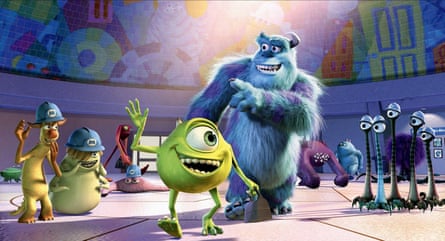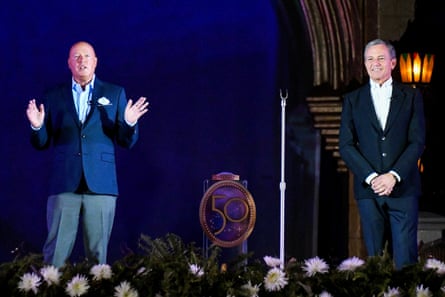Bob Iger expressed his hope for a smooth transition as he retired from his position at Disney after 15 years. However, things did not go as planned.
After eleven months, he was asked to come back from retirement. Iger, who was praised for turning an outdated Hollywood company into a successful group of new media businesses during his first term as leader, was given a second opportunity to guide the company back in the right direction.
The oceans are still rough. Currently, pirates are attempting to board the ship, as well-known activist investor Nelson Peltz pushes for changes in its leadership. Trian Partners, Peltz’s company, claims that the entertainment powerhouse has performed poorly.
According to Iger himself, his return has been more difficult than expected. Shortly before he resumed his position as CEO, the company became embroiled in America’s cultural battles. Although Iger appears to have prevailed against Florida Governor Ron DeSantis, who criticized Disney’s supposed “woke” culture, the company still faces challenges in its business.
The box office has not been performing well and Disney’s attempt to take over the streaming market has been costly. Despite owning popular brands like Pixar, Marvel, Lucasfilm, and most of 21st Century Fox, Disney is facing criticism. Their previously successful broadcast television arm is now struggling and there are concerns about the future of their sports network, ESPN.

Display the image in full screen mode.
“He’s got a lot to do,” said Jessica Reif Ehrlich, an analyst at Bank of America. “His focus is righting the ship and getting Disney to a very profitable place, in an environment that’s very different than it was when he left the company.”
Iger attempted to calm the situation by implementing several measures, including reducing the workforce by 7,000 employees in order to address Wall Street’s concerns about expenses. He also restructured the company and aims to decrease costs by approximately $7.5 billion. Despite his belief that these actions will allow Disney to move past this period of repair and focus on growth, there are still skeptics who are not convinced.
The central machine of Disney, which has always been dependable in creating films and shows that attract audiences to theaters, streaming services, theme parks, and retail locations, has recently experienced some setbacks. Iger has placed the revitalization of the company’s production studios as his top priority.
The future impact of movie theaters on the film industry is uncertain, but according to Ehrlich, Disney’s struggle to attract large audiences is a unique issue. She pointed to the success of films like Barbie and Oppenheimer last summer as evidence that people still go to the movies. Barbie was distributed by Warner Bros and Oppenheimer by Universal, which surpassed Disney as the highest-earning studio at the box office last year for the first time since 2015. Disney, on the other hand, had a string of high-profile failures, such as The Marvels. Only Guardians of the Galaxy Vol 3 made it into the top five highest-grossing films globally.
Disney increased its production in an attempt to compete with Netflix, with a focus on creating content related to Marvel superheroes and Star Wars, including spin-offs, prequels, sequels, and remakes. Although its streaming service Disney+ has gained 112.6 million subscribers in less than four years, making it the second largest after Netflix’s 260 million subscribers, Disney acknowledges that the high quantity of content may have affected its overall quality. This led to investors expressing concern over the platform’s large expenses.

Peltz has stated that the situation has reached its limit. He teamed up with Ike Perlmutter, who continues to be one of Disney’s major shareholders even after selling Marvel for $4 billion in 2009. Perlmutter, who is not on good terms with Iger, was removed from his position as chair of Marvel Entertainment’s comic-publishing division last year.
Trian and Perlmutter jointly own shares in Disney valued at approximately $2.5 billion. According to the company, in the past year until last May, they made 24 requests for Peltz to join the board. Despite Disney’s market value of over $170 billion, they continuously rejected the duo’s requests.
Ignore the newsletter advertisement.
after newsletter promotion
In the upcoming spring, Trian intends to present its plan for restructuring Disney’s board to the company’s shareholders, setting the stage for a potential confrontation. This move surprised many within the company as Trian recruited a former high-ranking Disney employee, Jay Rasulo, to join their cause. Rasulo, who previously served as chief financial officer and was once considered a potential successor to current CEO Bob Iger, now asserts that Disney has strayed from its core values.
Disney, who has their own group of potential board members, recently rejected the suggestion of having Peltz or Rasulo join their team. According to Disney, Peltz has not offered any significant strategic proposals for the company in the two years he has been pursuing this opportunity, and they believe he is unaware of the changes happening in the media industry. Additionally, Disney questions Rasulo’s capability to work collaboratively with Iger, as the industry has undergone major changes since his departure.
Trian promptly hit back, proposing five goals for the company – like improving the profitability of Disney+ and its theme parks, and commissioning a review of its studios designed to reclaim pole position at the box office – and blasting its leadership. “It is time to restore the magic at Disney,” said Peltz.
Disney did not provide a comment regarding the recent attack, but sources from within the company claim that Peltz has not presented a thorough plan. Trian, on the other hand, states that they will have more to share in the future. The firm chose not to provide further details when contacted this week.

Display image in full screen mode.
At the heart of Peltz’s initiative is a worry that, regardless of whether he secures a spot on the board, will still hold sway over Disney: the need for the company to “successfully finalize a CEO succession.”
After postponing his initial departure as CEO multiple times, Iger stepped down in February 2020 to allow Bob Chapek to become the new leader. However, when Chapek was removed in November 2022 and Iger was brought back on a two-year contract, the board has now extended his second term until 2026.
Although Iger has announced his intention to retire in 2026, many doubt the certainty of this decision. In a recent letter to investors, he stated that he is determined to complete his role in ensuring the company’s strong position for his successor. Despite the ongoing challenges faced by Disney, Iger will not be leaving his post anytime soon.
Source: theguardian.com


